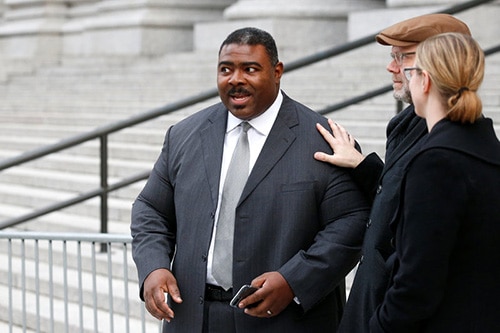Truth is stranger than fiction, they say.
And New Jersey pastor Trevón Gross’s bizarre journey from preaching on the Trinity Broadcast Network to his recently determined stint in U.S. federal prison is a prime example.
Today, Gross was officially sentenced to 5 years in prison and slapped with a $12,000 fine for his role in enabling the infamous and now-collapsed Coin.mx bitcoin exchange operators’ illegal money laundering operation.
His co-conspirators, Yuri Lebedev and Anthony Murgio, were first arrested and charged back in 2015.
So how’s a New Jersey pastor who was once endorsed by celebrity televangelist Joel Osteen get himself wrapped up in a crypto crime enterprise in the first place? We’ll walk you through it.
Where’d it all go wrong?
 In being the founder of Hope Cathedral church, Gross served as the director for the church’s associated credit union.
In being the founder of Hope Cathedral church, Gross served as the director for the church’s associated credit union.
Murgio and Lebedev approached Gross sometime before 2015, offering more than $150,000 to the pastor in exchange for commandeering Hope Cathedral’s credit union to hide the illicit activities of their Coin.mx exchange.
As Chairman of the credit union, Gross accepted the bribes—which he maintains were donations—and accordingly gave Lebedev and Murgio positions on the union’s board. This gave the two men de facto control of the institution.
The problem? Murgio and Lebedev were using Coin.mx to launder funds for a group of overseas ransomware hackers that were specifically tied to a series of Wall Street hacks against companies like Chase and JPMorgan back in 2014.
Per Reuters, these specific hacks “exposed more than 83 million accounts.”
That means Gross’s handover of Hope Cathedral’s credit union gave these fraudsters the ability to hide their laundering and financially service the overseas hackers—at least for a time.
Authorities close in on the trio
The National Credit Union Administration uncovered abnormalities in Gross’s credit union’s activities, and they tipped off federal investigators.
This led to the eventual arrests of Murgio and Lebedev and then Gross.
Charges related to unlicensed money transmissions came against the men out of the U.S. Attorney’s Office of the Southern District of New York. For their part, though, Lebedev and Murgio were, and continue to be, tried in the Middle District of Florida.
The U.S.’s Federal Bureau of Investigations (FBI) released a statement after charges in the Coin.mx case were first filed, declaring that the men knew what they were doing was wrong.
In doing so, Murgio and his co-conspirators knowingly enabled the criminals responsible for those attacks to receive the proceeds of their crimes, yet, in violation of federal anti-money laundering laws, Murgio never filed any suspicious activity reports regarding any of the transactions
So the scheme was finally busted, but not before everyday, innocent members of Hope Cathedral’s credit union had their accounts liquidated.
Lesson learned
The moral of the story? Greed tempts the best of us, even those of us who seem they’d be least likely to be corruptible.
Lebedev and Murgio took advantage of Gross, yes, but the pastor made the choice to go along with their scheme—he knew in his heart the two conmen weren’t giving him “donations.”
And now the price he must pay is 5 years in prison and the legacy of having destroyed many of his own church members’ lives by commandeering their credit union accounts.
Was it worth it? Hardly, we think.
But Gross will have 1,825 days in prison to think it over.
Images via Fotolia and brucegerencser



